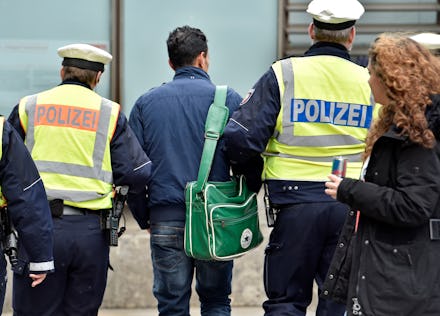Prosecutors in Cologne, Germany, Offer Cash Reward for Info on New Year's Eve Sex Assaults

Germany's most wanted sex criminals now have a price on their heads.
Prosecutors in Cologne, Germany, announced Thursday that they have nearly $11,000 for anyone with information on the perpetrators of the assaults, robberies and rapes that tarnished the city's New Year's Eve celebration. According to the Associated Press, the prosecutors are fielding 652 criminal complaints: Of these, chief prosecutor Ulrich Bremer said, 331 were for sexual assault, with two rape allegations. Bremer told the AP that 13 men have been charged, but for robbery-related crimes.
Law enforcement hasn't seen much in the way of success in attempting to bring offenders to justice. Outrage over the incident has spurred Germany's right wing to action, which raises the question: Will offering a reward improve investigative efforts in Cologne?
"We are experiencing a new dimension of hatred," Almin Mazjek, the head of Germany's Muslim Council, told the Independent. "The far-right mob sees its prejudices confirmed and an opportunity to give free rein to hatred of Muslims and foreigners."
Police have their work cut out for them: The AP reported that they've already examined 350 hours of video and the testimony of 120 witnesses in the course of their investigation. An estimated 1,000 men helped carry out the attacks, the BBC reported; the scale of the crime wave overwhelmed authorities. The volume of people — victims and perpetrators — alone makes the successful prosecution of these assaults an intimidating, even unlikely, prospect. And now that a cash incentive is on the table, there's a new layer of complication to color the investigation: vigilantism.
Almost immediately, former Cologne Police Chief Wolfgang Albers announced that those responsible for the attacks were thought to be "Arab or North African" in appearance. On Sunday, interior minister for North Rhine-Westphalia, Ralf Jäger, said in a report that the only suspects being investigated were indeed immigrants, largely from North Africa. Jäger confirmed what some within Germany had already taken for granted, but they didn't need his confirmation to act on their suspicions. Germany's right-wing fringe used the attacks as ammo from the first, offering them as proof that migrants can't mix with German nationals.
Saturday saw protests throughout Cologne — both by the anti-Islam group Pegida, Patriotic Europeans Against the Islamization of the West, and counter-demonstrators urging an end to xenophobic sentiments from the right. Pegida's protest turned violent, with police deploying water cannons to disperse crowds hurling bottles and fireworks, calling both for Chancellor Angela Merkel's ouster and the removal of migrants from Germany's border.
Then, on Sunday night, self-organized mobs took to Cologne's streets in a "manhunt," with gangs of German men setting upon a group of six Pakistani men and one Syrian national.
On Monday, Pegida organized another rally, this time in Leipzig, where a crowd of 2,000 protesters gathered in the city center. Demonstrators celebrated the one-year anniversary of Pegida's Leipzig chapter, Legida, and propagated familiar anti-Merkel and anti-Muslim slogans.
Later that night, the situation in Leipzig turned violent, as over 200 "neo-nationalist" rioters launched a vandalism spree, smashing the windows of migrant-owned shops and trashing their insides, according to RT. A mob reportedly planned an attack on a local activist soccer club and stormed bars and restaurants in the area, clashing with police in the streets.
The far-right needs no cash incentive to get involved in the punishment of the New Year's crimes. So how will offering money to civilian informants help?
Rewards do, in certain cases, cause individuals sitting on valuable information to come forward when they otherwise wouldn't, as a former police chief superintendent, Nick Howe, told the BBC in 2014. They also tend to coincide with cases that induce "moral outrage," as the New Year's attacks do. And if people initially seemed reticent to step forward, the number of complaints lodged with the police indicates that said reticence has evaporated.
That could be a big problem. In the eyes of extremists, it seems, anyone of a particular appearance is a likely suspect. Encouraging all German citizens to get involved in the investigation may yield valuable leads, but it may also provide another outlet for baseless accusations against innocent people.
"What the police don't want to do is to contaminate evidence and the integrity of the investigation," Howe told the BBC.
That could be exactly what happens, if the reward opens the door to people acting out of ill-will toward the migrant population as a whole.